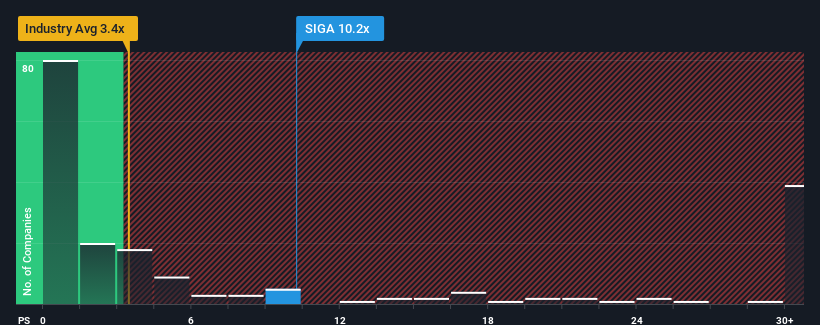
You may think that with a price-to-sales (or "P/S") ratio of 10.2x SIGA Technologies, Inc. (NASDAQ:SIGA) is a stock to avoid completely, seeing as almost half of all the Pharmaceuticals companies in the United States have P/S ratios under 3.4x and even P/S lower than 0.6x aren't out of the ordinary. Nonetheless, we'd need to dig a little deeper to determine if there is a rational basis for the highly elevated P/S.
See our latest analysis for SIGA Technologies

What Does SIGA Technologies' P/S Mean For Shareholders?
SIGA Technologies could be doing better as its revenue has been going backwards lately while most other companies have been seeing positive revenue growth. One possibility is that the P/S ratio is high because investors think this poor revenue performance will turn the corner. If not, then existing shareholders may be extremely nervous about the viability of the share price.
If you'd like to see what analysts are forecasting going forward, you should check out our free report on SIGA Technologies.Do Revenue Forecasts Match The High P/S Ratio?
The only time you'd be truly comfortable seeing a P/S as steep as SIGA Technologies' is when the company's growth is on track to outshine the industry decidedly.
Taking a look back first, the company's revenue growth last year wasn't something to get excited about as it posted a disappointing decline of 84%. This means it has also seen a slide in revenue over the longer-term as revenue is down 62% in total over the last three years. Accordingly, shareholders would have felt downbeat about the medium-term rates of revenue growth.
Shifting to the future, estimates from the sole analyst covering the company suggest revenue should grow by 406% over the next year. With the industry only predicted to deliver 28%, the company is positioned for a stronger revenue result.
In light of this, it's understandable that SIGA Technologies' P/S sits above the majority of other companies. It seems most investors are expecting this strong future growth and are willing to pay more for the stock.
What Does SIGA Technologies' P/S Mean For Investors?
We'd say the price-to-sales ratio's power isn't primarily as a valuation instrument but rather to gauge current investor sentiment and future expectations.
Our look into SIGA Technologies shows that its P/S ratio remains high on the merit of its strong future revenues. It appears that shareholders are confident in the company's future revenues, which is propping up the P/S. Unless the analysts have really missed the mark, these strong revenue forecasts should keep the share price buoyant.
We don't want to rain on the parade too much, but we did also find 2 warning signs for SIGA Technologies (1 is potentially serious!) that you need to be mindful of.
If these risks are making you reconsider your opinion on SIGA Technologies, explore our interactive list of high quality stocks to get an idea of what else is out there.
If you're looking to trade SIGA Technologies, open an account with the lowest-cost platform trusted by professionals, Interactive Brokers.
With clients in over 200 countries and territories, and access to 160 markets, IBKR lets you trade stocks, options, futures, forex, bonds and funds from a single integrated account.
Enjoy no hidden fees, no account minimums, and FX conversion rates as low as 0.03%, far better than what most brokers offer.
Sponsored ContentNew: Manage All Your Stock Portfolios in One Place
We've created the ultimate portfolio companion for stock investors, and it's free.
• Connect an unlimited number of Portfolios and see your total in one currency
• Be alerted to new Warning Signs or Risks via email or mobile
• Track the Fair Value of your stocks
Have feedback on this article? Concerned about the content? Get in touch with us directly. Alternatively, email editorial-team (at) simplywallst.com.
This article by Simply Wall St is general in nature. We provide commentary based on historical data and analyst forecasts only using an unbiased methodology and our articles are not intended to be financial advice. It does not constitute a recommendation to buy or sell any stock, and does not take account of your objectives, or your financial situation. We aim to bring you long-term focused analysis driven by fundamental data. Note that our analysis may not factor in the latest price-sensitive company announcements or qualitative material. Simply Wall St has no position in any stocks mentioned.
About NasdaqGM:SIGA
SIGA Technologies
A commercial-stage pharmaceutical company, focuses on the health security related markets in the United States.
Flawless balance sheet with high growth potential.


